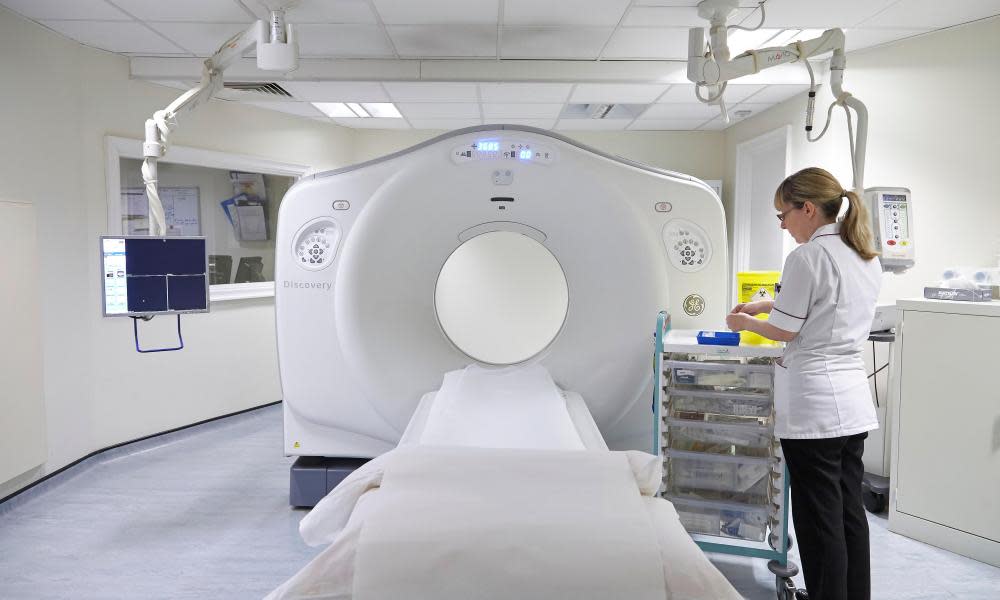English hospitals in urgent need of more scanners and staff to deal with backlog

Hospital trusts across England urgently need more equipment, staff and space to deal with a huge backlog of scans for cancer and other conditions, as more than 600,000 people await CT, MRI and other scans amid the coronavirus crisis.
More than half of all patients in England referred for imaging diagnostics are waiting for six weeks or more, official data shows, with that number ballooning from 20,898 in May 2019 to 326,525 in May 2020.
Responding to freedom of information requests, NHS trusts detailed the additional equipment needed to deal with the backlog, while NHS providers, which represents trusts, warned that many scanners currently in use were “faulty and unreliable, causing delay, disruption and added anxiety for patients”.
Croydon health service, in south London, said that within six weeks it would need one CT (computerised tomography) scanner, which creates cross-sectional images of the body, one MRI (magnetic resonance imaging) scanner, using magnetic fields and radio waves to produce internal images, and two ultrasound scanners to address the shortfall.
Leeds teaching hospitals NHS trust needs two MRI scanners and two CT scanners, as well as extra staff to operate them and more space for patient waiting areas.
Great Western hospitals NHS foundation trust, in Wiltshire, needs two CT scanners but would also need qualified staff and for other scanners to operate at full capacity. Oxford University hospitals NHS foundation trust said it needed two static CT scanners, three static MRI scanners and four sonographers.
Saffron Cordery, the deputy chief executive of NHS Providers, said England already lagged behind many other countries in terms of the number of CT scanners in operation. “Much of the existing stock is faulty and unreliable, causing delay, disruption and added anxiety for patients,” she said.
“The pressures are likely to intensify in the coming months as more people are referred for scans, reflecting pent up demand that didn’t surface during the initial surge of Covid-19 cases.”
She said hospital bosses had said investment in equipment such as MRI and CT scanners, X-ray machines and ultrasound equipment was an urgent priority.
Data shows the huge waiting lists at some hospitals. At the Royal Free hospital in London – one of the bigger trusts – 34,769 patients were waiting in June up from 30,242 a year ago.
Addenbrookes in Cambridge had 39,009 patients awaiting imaging studies – 632 of these were cancer patients – as of 10 June 2020, up from 28,684 at the same time last year.
Cambridge University hospitals’ medical director, Ashley Shaw, a radiologist, said there was acute awareness of the need to get imaging up to speed. He said: “The challenge is one of creating safe patient access to imaging facilities in a manner that respects the social distancing and other infection prevention rules set out nationally… We have for some time been utilising private sector hospitals and are establishing other additional resources, including mobile facilities, to increase volumes.”
The Royal College of Radiologists described the equipment shortage and backlog as a “perfect storm”.
Dr Caroline Rubin said there was a “significant block capacity gap in terms of the number of scanners”, with the UK having one of the lowest number when compared with other OECD countries.
There also need to be more staff to run them, she said. “So not just radiologists but radiographers, it is a whole-team approach that we need to get right.” She said it took time to train staff and there was inadequate funding.
“It’s sort of a perfect storm in terms of delivering capacity, it was not good before Covid-19 and now it has reduced as a result of it. I have no idea how long it will take to clear the backlog, we are doing all we can in terms of trying to get patients through,” she said.
Sara Bainbridge, the head of policy at Macmillan Cancer Support, said: “Covid-19 has only made a bad situation worse. There is a growing backlog of patients who need the care and attention of a workforce that’s already stretched to breaking point.”
NHS England said: “NHS staff provided more than 5m urgent tests, checks and treatment in a safe way during the peak of the virus. Looking forwards there is no doubt that the NHS does need more diagnostic capacity, and so will be deploying some of its growing capital budget to do so.”

 Yahoo News
Yahoo News 
